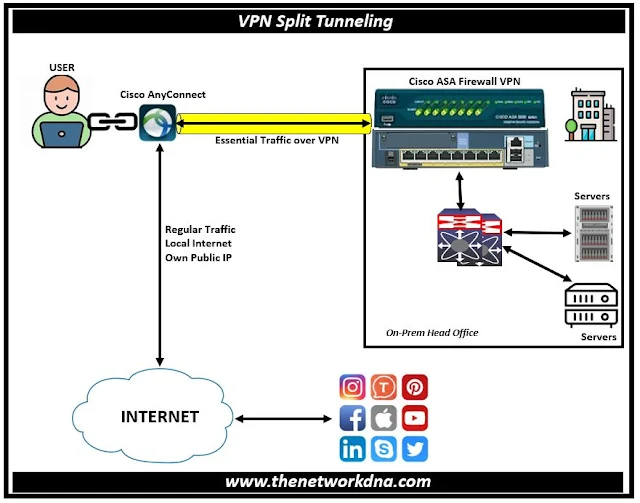VPN Split Tunneling Explained
VPN Split Tunneling Explained
Virtual private networks, or VPNs, are becoming increasingly important for businesses who has remote workers. Through the creation of an encrypted tunnel for internet traffic, VPNs improve privacy, security, and access to resources that are banned. The purpose is to sending all traffic via a VPN tunnel.
What is VPN Split Tunneling ?
It is a configurational setup in which a VPN is used to route only certain types of data traffic. The remaining data is forward straight via the local internet at the same moment.
 |
| Fig 1.1- VPN Split Tunneling |
With split tunneling, certain apps and data have direct access to the Internet while other data and apps are routed over an encrypted VPN connection. When your computer is directly connected to a remote network at your company, such as in a work-from-home arrangement, this becomes particularly significant for VPNs that provide remote access.
Compared to a standard VPN, split tunneling gives you two possible paths: the VPN tunnel and the public internet. The secure VPN connection is used for sensitive traffic, such as corporate networks, banking apps, medical systems, and streaming media that needs location spoofing. In the meantime, routine internet activity such as gaming, streaming videos, and basic web browsing stays outside on public networks.
You may have the best of both worlds with this level of granular traffic management uncompromised privacy where you need it, without compromising functionality or speed.
Benefits of VPN Split Tunneling
- Enhanced Performance: Split tunneling reduces the workload on the VPN server by sending only certain traffic over the VPN connection. Applications like streaming services and online gaming that don't need VPN encryption are able to run at more quickly as a result.
- Reduced Latency: Applications that require low latency, like online gaming and video conferencing, can connect to the internet directly through split tunneling. Delays are reduced, and a more seamless experience is guaranteed.
- Saves Bandwidth: Not all internet activity must pass via the VPN. With split tunneling, you may keep non-sensitive information out of the VPN tunnel, such as social network browsing and downloading big files. By doing this, bandwidth is saved and the VPN server isn't put to unnecessary load.
- Privacy and Security: Split tunneling is useful, but it must be managed properly. You can maintain privacy for key activities (like online banking or accessing work-related materials) and keep other data separate by permitting only suitable traffic to pass through the VPN.
Disadvantages of using VPN split tunneling
- Reduced Security: As split tunneling works besides your VPN's security security measures, part of your online activities is vulnerable to hackers. As traffic outside of the VPN is not encrypted, sensitive data may be vulnerable to threats.
- Restricted VPN Support: Split tunneling capabilities aren't offered by all VPN providers, and even those that do might not work with every OS system. There can be differences in compatibility and availability between VPN providers.
- Increased Threat Surface: Split tunneling increases the attack surface by permitting some traffic bypass the VPN. A remote staff PC could get compromised with malware or face other security hazards if they access a dangerous website when split tunneling is enabled.
- Complex Configuration: Setting up the right split tunneling permissions can be time-consuming and requires careful planning. Administrators need to define which applications or services should use the VPN tunnel and which ones should access the open internet directly
Continue Reading...
- Back to Basics: Understand the different types of VPN
- Palo Alto Networks : Policy based VPN vs Route based VPN
- Quick start on Secure Sockets Layer (SSL) VPN
- Protecting Your Data: How the Top 5 VPN Services for 2024 Ensure Online Security
- Cisco Meraki to Azure Site to Site VPN
- Understanding the Basics: L2VPN vs L3VPN
- Security: FortiGate to SonicWall VPN Tunnel setup







